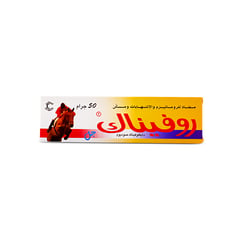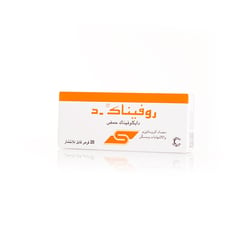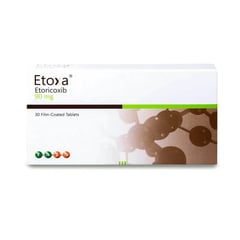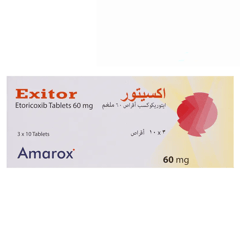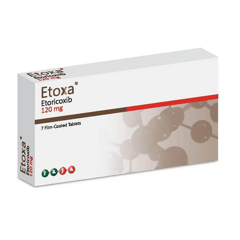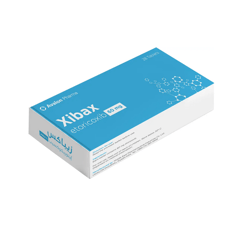Etoxa 60 Mg 30 Tablets

In stock
SKU :
1007-SJ001
helps to reduce the pain and swelling (inflammation) in the joints and muscles of people 16 years of age and older with osteoarthritis, rheumatoid arthritis, ankylosing spondylitis and gout.
What Etoricoxib is and what it is used for:
ETORICOXIB is one of a group of medicines called selective COX-2 inhibitors. These belong to a family of medicines called non-steroidal anti-inflammatory drugs (NSAIDs).
What is ETORICOXIB used for?
• ETORICOXIB helps to reduce the pain and swelling (inflammation) in the joints and muscles of people 16 years of age and older with osteoarthritis, rheumatoid arthritis, ankylosing spondylitis and gout.
• ETORICOXIB is also used for the short term treatment of moderate pain after dental surgery in people 16 years of age and older.
What is osteoarthritis?
Osteoarthritis is a disease of the joints. It results from the gradual breakdown of cartilage that cushions the ends of the bones. This causes swelling (inflammation), pain, tenderness, stiffness and disability.
What is rheumatoid arthritis?
Rheumatoid arthritis is a long term inflammatory disease of the joints. It causes pain, stiffness, swelling, and increasing loss of movement in the joints it affects. It may also cause inflammation in other areas of the body.
What is gout?
Gout is a disease of sudden, recurring attacks of very painful inflammation and redness in the joints. It is caused by deposits of mineral crystals in the joint.
What is ankylosing spondylitis?
Ankylosing spondylitis is an inflammatory disease of the spine and large joints.
What you need to know before you use Etoricoxib
Do not use Etoricoxib:
Tell your doctor if you:
• if you are allergic (hypersensitive) to etoricoxib or any of the other ingredients of this medicine
• if you are allergic to non-steroidal anti-inflammatory drugs (NSAIDs), including aspirin and COX-2 inhibitors
• if you have a current stomach ulcer or bleeding in your stomach or intestines
• if you have serious liver disease
• if you have serious kidney disease
• if you are or could be pregnant or are breastfeeding
• if you are under 16 years of age
• if you have inflammatory bowel disease, such as Crohn’s Disease, Ulcerative Colitis, or Colitis
• if you have high blood pressure that has not been controlled by treatment (check with your doctor or nurse if you are not sure whether your blood pressure is adequately controlled)
• if your doctor has diagnosed heart problems including heart failure (moderate or severe types), angina (chest pain)
• if you have had a heart attack, bypass surgery, peripheral arterial disease (poor circulation in legs or feet due to narrow or blocked arteries)
• if you have had any kind of stroke (including mini-stroke, transient ischaemic attack or TIA). Etoricoxib may slightly increase your risk of heart attack and stroke and this is why it should not be used in those who have already had heart problems or stroke.
Warnings and precautions:
You should let your doctor know that:
• You have a history of stomach bleeding or ulcers.
• You are dehydrated, for example by a prolonged bout of vomiting or diarrhoea.
• You have swelling due to fluid retention.
• You have a history of heart failure, or any other form of heart disease.
• You have a history of high blood pressure. ETORICOXIB can increase blood pressure in some people, especially in high doses, and your doctor will want to check your blood pressure from time to time.
• You have any history of liver or kidney disease.
• You are being treated for an infection. ETORICOXIB can mask or hide a fever, which is a sign of infection.
• You have diabetes, high cholesterol, or are a smoker. These can increase your risk of heart disease.
• You are a woman trying to become pregnant.
• You are over 65 years of age.
Other medicines and Etoricoxib:
Please tell your doctor or pharmacist if you are taking, have recently taken or might take any other medicines, including medicines obtained without a prescription.
• medicines that thin your blood (anticoagulants), such as warfarin
• rifampicin (an antibiotic)
• methotrexate (a drug used for suppressing the immune system, and often used in rheumatoid arthritis)
• ciclosporin or tacrolimus (drugs used for suppressing the immune system)
• lithium (a medicine used to treat some types of depression)
• medicines used to help control high blood pressure and heart failure called ACE inhibitors and angiotensin receptor blockers, examples include enalapril and ramipril, and losartan and valsartan
• diuretics (water tablets)
• digoxin (a medicine for heart failure and irregular heart rhythm)
• minoxidil (a drug used to treat high blood pressure)
• salbutamol tablets or oral solution (a medicine for asthma)
• birth control pills (the combination may increase your risk of side effects)
• hormone replacement therapy (the combination may increase your risk of side effects)
• aspirin, the risk of stomach ulcers is greater if you take ETORICOXIB with aspirin.
o aspirin for prevention of heart attacks or stroke:
ETORICOXIB can be taken with low-dose aspirin. If you are currently taking low-dose aspirin to prevent heart attacks or stroke, you should not stop taking aspirin until you talk to your doctor
o aspirin and other non-steroidal anti-inflammatory drugs (NSAIDs):
do not take high dose aspirin or other anti-inflammatory medicines while taking ETORICOXIB.
How to use Etoricoxib:
Always take this medicine exactly as your doctor has told you. Check with your doctor or pharmacist if you are not sure.
Do not take more than the recommended dose for your condition. Your doctor will want to discuss your treatment from time to time. It is important that you use the lowest dose that controls your pain and you should not take ETORICOXIB for longer than necessary. This is because the risk of heart attacks and strokes might increase after prolonged treatment, especially with high doses.
There are different strengths available for this medicinal product and depending on your disease your doctor will prescribe the tablet strength that is appropriate for you.
The recommended dose is:
Osteoarthritis
The recommended dose is 30 mg once a day, increase to a maximum of 60 mg once a day if needed.
Rheumatoid arthritis
The recommended dose is 60 mg once a day, increased to a maximum of 90 mg once a day if needed.
Ankylosing spondylitis
The recommended dose is 60 mg once a day, increased to a maximum of 90 mg once a day if needed.
Acute pain conditions
Etoricoxib should be used only for the acute painful period.
Gout
The recommended dose is 120 mg once a day which should only be used for the acute painful period, limited to a maximum of 8 days treatment.
Postoperative dental surgery pain
The recommended dose is 90 mg once daily, limited to a maximum of 3 days treatment.
People with liver problems
If you have mild liver disease, you should not take more than 60 mg a day.
If you have moderate liver disease, you should not take more than 30 mg a day.
Use in children and adolescents
ETORICOXIB tablets should not be taken by children or adolescents under 16 years of age.
Elderly
No dose adjustment is necessary for elderly patients. As with other medicines, caution should be exercised in elderly patients.
Method of administration:
ETORICOXIB is for oral use. Take the tablets once a day. ETORICOXIB can be taken with or without food.
Possible side effects:
Stop using the product and seek immediate medical attention if you develop any of the following signs
• shortness of breath, chest pains, or ankle swelling appear or if they get worse
• yellowing of the skin and eyes (jaundice) – these are signs of liver problems
• severe or continual stomach pain or your stools become black
• an allergic reaction- which can include skin problems such as ulcers or blistering, or swelling of the face, lips, tongue, or throat which may cause difficulty in breathing
How to store Etoricoxib:
• Keep this medicine out of the sight and reach of children.
• Do not use this medicine after the expiry date which is stated on the carton. The expiry date refers to the last day of that month.
• Bottles: Keep the container tightly closed in order to protect from moisture.
• Blisters: Store in the original package in order to protect from moisture.
• Do not throw away any medicines via wastewater or household waste. Ask your pharmacist how to throw away medicines you no longer use. These measures will help protect the environment.
| Shipping Type | Express |
|---|
Write Your Own Review
The largest selection of casino games and sports bets at 1xbet app.



